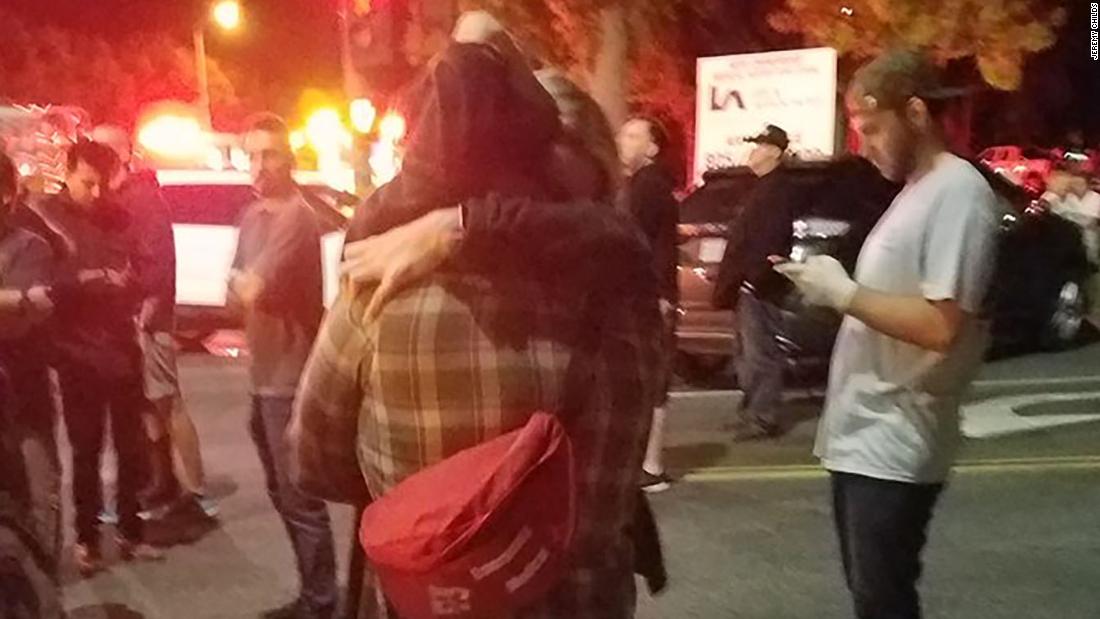
Any ruthless attack on people is shocking, but attacks on soft targets are particularly disturbing. Soft targets represent simple, daily life. People come and go. They expect to be safe as they pick up a cup of coffee, deposit their paychecks, fill prescriptions or grab a bite to eat. Their guards are down.
The death toll in the four recent incidents has been stunning, with 27 people slain:
• Two shoppers gunned down October 24 in the parking lot and inside a Kroger in Jefferson, Kentucky.
• Eleven people attending Shabbat services killed October 27 when an armed man walked into a Pittsburgh synagogue. Six people were wounded, including four responding police officers.
• Two women, a physician and a college senior, shot to death November 2 inside a yoga studio in Tallahassee, Florida. The gunman wounded four other people.
• And on Wednesday, 12 people killed and more than a dozen injured when a masked man opened fire inside a bar in Thousand Oaks, California.
These places typically are safe, and they're supposed to be accessible. The ease of ingress and egress is key to their success, in some cases.
Too often, bad people know this.
The US State Department recently addressed these types of attacks on its blog, DipNote.
"Attacks on public spaces -- locations where civilians work, dine, shop, and vacation -- are tragic for the innocent lives lost as well as the violent assault on a country's daily way of life," the September post said.
While the blog post addressed terrorism (authorities have not classified any of the latest four attacks as terrorism yet) the strategy for protecting a soft target is complex, no matter who is targeting it.
"Restaurants, stadiums, and entertainment venues are designed to be open and accessible, leaving them vulnerable," according to the blog post. "The types of places attacked vary, as do the types of attacks, which generally involve some combination of suicide bombers, gunmen, hostages, or low-tech tactics that turn knives or vehicles into murderous weapons."
America has faced the threat so many times -- at a theater in Aurora, California, at a concert in Las Vegas, at the Boston Marathon. Every school shooting is an attack on a soft target.
"It's not like trying to get into a government building or trying to get onto a plane. We've hardened those targets," CNN law enforcement analyst James Gagliano said.
A former FBI agent, Gagliano said he knows that there are some people out there who will demand security anywhere people gather to revel or conduct routine business. While he's not sold on the argument, he sees the merit in the debate, he said.
"Even if you had an armed guard, there ... action is faster than reaction. That armed guard, in all likelihood, would've been the first casualty," he said. "Now, the counterargument is, yes, but that's a deterrent. I think we have to weigh that and look at it."
Law enforcement experts say there are ways to make oneself less of a target. There are active shooter trainings all over the country that instruct people to avoid, deny and defend.
The training is about knowing where the exits are and planning an escape before anything goes awry. In the event of a shooting, people should barricade doors, turn off lights, silence phones and hide, preferably behind something bulletproof. If all else fails, fight like hell, experts say.
But that speaks only to what happens after the attack is underway. Prevention would be preferable, which is why the US Department of Homeland Security earlier this year published a guide to securing soft targets and crowded places.
It calls on everyone -- business owners, first responders, government agencies and the general public -- to do what they can to protect their own patch.
There are resources to help understand what constitutes suspicious behavior and what behaviors might indicate a pathway to violence, as well as instructions on how businesses and houses of worship can identify threats and secure their venues. There are also resources for conducting proper bag checks at large venues, as well as ways businesses can stop the sales of precursor chemicals for explosives.
"Given the increased emphasis by terrorists and other extremist actors to leverage less sophisticated methods to inflict harm in public areas, it is vital that the public and private sectors collaborate to enhance security of locations such as transportation centers, parks, restaurants, shopping centers, special event venues, and similar facilities," DHS says.
"Securing these locations and venues is essential to preserving our way of life and sustaining the engine of our economy."
No comments:
Post a Comment